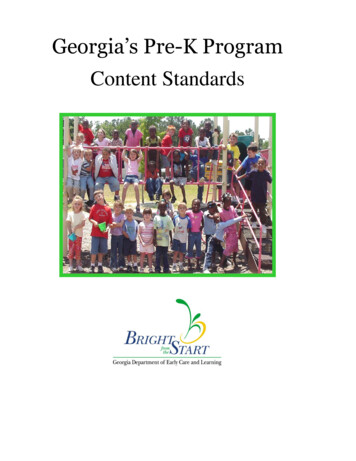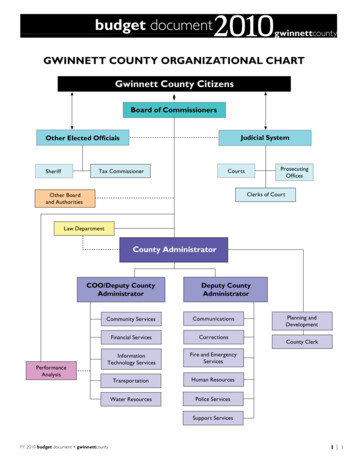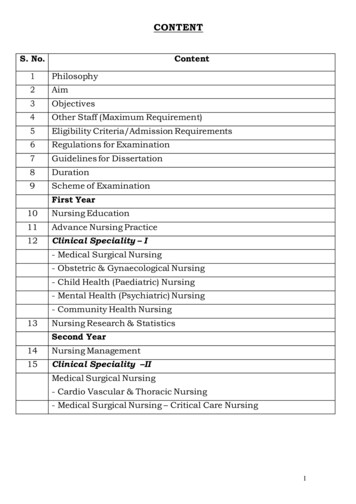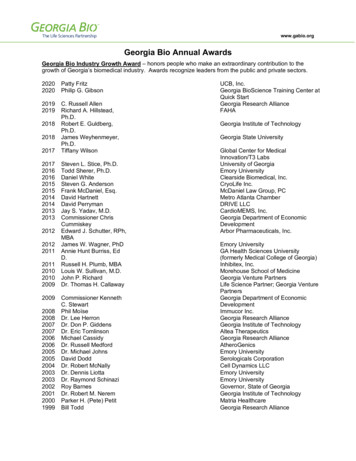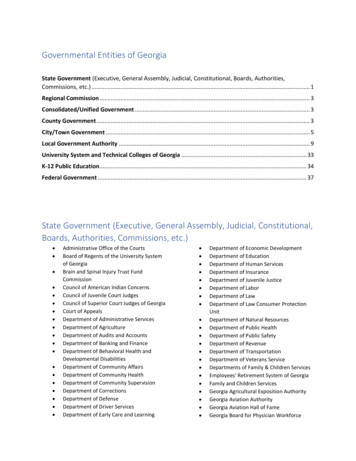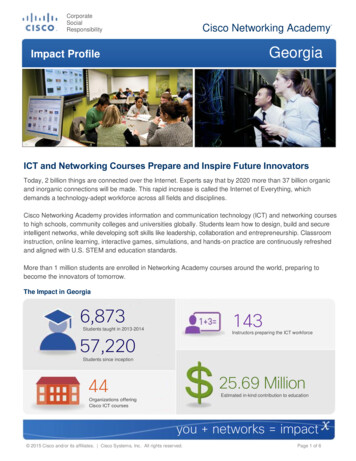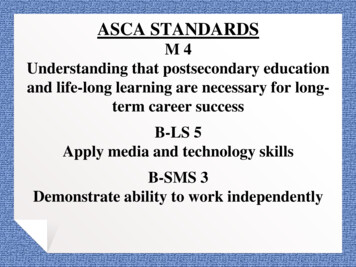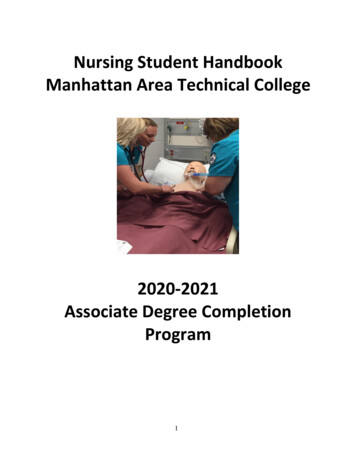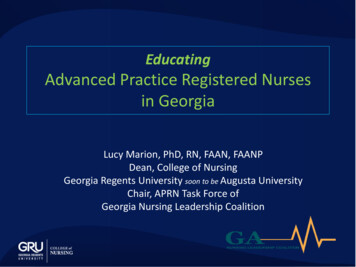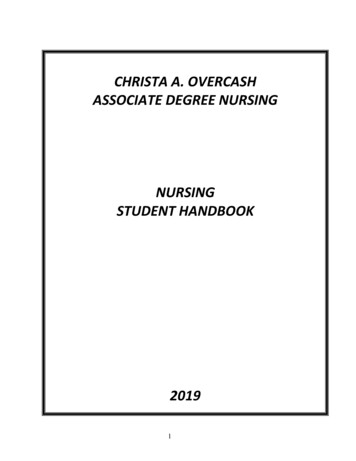
Transcription
Georgia Gwinnett CollegeNursing Student Handbook2021 - 20221
Page left intentionally blank2
TABLE OF CONTENTSGEORGIA GWINNETT COLLEGE MISSION AND VISION . 5VISION .5MISSION.5ACCREDITATION STATUS .5MESSAGE FROM THE DEAN OF SCHOOL OF HEALTH SCIENCES . 6SHS STAFF . 6NURSING PROGRAM VISION, MISSION, PROGRAM GOALS, PHILOSOPHY, AND STUDENT OUTCOMES . 7VISION .7MISSION.7NURSING PROGRAM ACCREDITATION STATUS .7PROGRAM GOALS .7NURSING PROGRAM PHILOSOPHY .7Caring .7Health, People, and Environments .8Nursing and Nursing Practice.8Nursing Education .8EXPECTED STUDENT OUTCOMES .9NURSING PROGRAM OF STUDY . 11ADDITIONAL ADMISSION REQUIREMENTS.12ACADEMIC INFORMATION AND POLICIES . 13STUDENT CONCERNS AND STRUCTURE FOR INFORMATION.13PROFESSIONAL BEHAVIOR POLICY .13INFORMAL CONCERN AND FORMAL COMPLAINT POLICY .13FORMAL COMPLAINT PROCESS .13STUDENTS WITH DISABILITIES .14CLASS ATTENDANCE & INCLEMENT WEATHER.14PANDEMIC STATEMENT .14PROGRESSION POLICY WITHIN THE BACCALAUREATE NURSING PROGRAM .14GRADING POLICIES AND REQUIREMENTS.16GRADE POINT AVERAGE .16WITHDRAWALS FROM NURSING COURSES.16DELAYED PROGRAM PROGRESSION .16DISMISSAL FROM THE BACCALAUREATE NURSING PROGRAM .16COURSE EXAMINATIONS .17Procedure for Taking Exams—This procedure may be modified to meet the needs of each course: .17Individual Review of Exams .18Exam Item Appeals .18Posting of Test Grades .18Standardized Testing.19Dosage Calculation Policies.19EXPECTATIONS OF STUDENTS, FACULTY, CLINICAL, COURSES, AND THE NURSING PROGRAM . 19STUDENT CONDUCT CODE .19ACADEMIC INTEGRITY.19CLASSROOM BEHAVIOR .203
SMOKING ON CAMPUS AND IN CLINICAL AGENCIES .20EVALUATION OF THE NURSING PROGRAM .20CLINICAL EXPERIENCES: INFORMATION AND POLICIES . 20GENERAL INFORMATION .20ATTENDANCE AND CONDUCT .21POLICY ON UNSAFE OR UNETHICAL PRACTICE BEHAVIORS .21PATIENT CONFIDENTIALITY .22CLINICAL DRESS CODE .22DRESS CODE FOR GGC SIMULATION AND NURSING PRACTICE LAB .23DRESS CODE FOR OPEN PRACTICE LAB .23CLINICAL LAB, VALIDATION, AND SIMULATION LABORATORY INFORMATION AND POLICIES . 23CLINICAL PRACTICE & SIMULATION LABORATORIES .23OPEN PRACTICE LAB .23LAB REQUIREMENTS .24APPEALS PROCESS FOR ACADEMIC OR UNSATISFACTORY CLINICAL PERFORMANCE .24GENERAL STUDENT INFORMATION AND POLICIES . 24FINANCIAL AID/SCHOLARSHIP OPPORTUNITIES .24NURSING OFFICE.24ANNOUNCEMENTS .24STUDENT INFORMATION AND RECORDS .24ASSIGNMENTS .25USE OF ELECTRONIC COMMUNICATION DEVICES .25REPRODUCTION OF ANY EVALUATION MATERIALS .25CHILDREN IN CLASS, CLINICAL, OR SKILLS LABORATORY .25EMPLOYMENT .25PROGRAM EXPENSES .25HEALTH REQUIREMENTS AND RESPONSIBILITIES .26STUDENT HANDBOOK AND COURSE SYLLABUS .27GRADUATION REQUIREMENTS .27ADDITIONAL POLICIES. 27STUDENT SUPPORT SERVICES AND ACTIVITIES .27NURSING CLUBS AND ORGANIZATIONS .28National Student Nurses Association (NSNA) and Gwinnett Grizzly Bears Association of Nursing Students(GGBANS) .28Nursing Student Government (NSG) .28Student Representation on Nursing Program Committees .28APPENDIX A – EXAM ITEM APPEAL FORM . 29APPENDIX B – STUDENT HANDBOOK ACKNOWLEDGMENT FORM . 31APPENDIX C – HEALTH INSURANCE LIABILITY ACKNOWLEDGMENT FORM . 33APPENDIX D – TECHNOLOGY LOANER AGREEMENT . 35APPENDIX E—RECOMMENDATION LETTER & PERMISSION TO RELEASE EDUCATION RECORD INFORMATION . 374
GEORGIA GWINNETT COLLEGE MISSION AND VISIONGeorgia Gwinnett College is a premier 21st-century liberal arts college where learning takes place withinand beyond the structures of the traditional classroom. The College is built on the cornerstones of theinnovative use of educational technology and the commitment to an integrated experience thatdevelops the whole person. GGC's focus is on a face-to-face classroom experience with portabletechnology solutions allowing students to learn, study and work both on and off campus. GeorgiaGwinnett College is the first public, four-year college to be founded in Georgia in more than 100 years.VISIONGeorgia Gwinnett College will be a premier 21st-century Liberal Arts College where learning will takeplace continuously in and beyond the confines of the traditional classroom. Its cornerstones will beinnovative use of educational technology and a commitment to an integrated educational experiencethat develops the whole person. GGC will be a wellspring of educational innovation. It will be a dynamiclearning community where faculty engagement in teaching and mentoring students will be the hallmark.It will be a driving force for change in student success. As such, it will be a model for innovativeapproaches to education, faculty engagement with students, and highly efficient student, facility, andadministrative services.MISSIONGeorgia Gwinnett College provides access to targeted baccalaureate and associate level degrees thatmeet the economic development needs of the growing and diverse population of the northeast Atlantametropolitan region. It emphasizes the innovative use of technology and active-learning environmentsto provide its students’ enhanced learning experiences, practical opportunities to apply knowledge,increased scheduling flexibility, and a variety of course delivery options. Georgia Gwinnett's outstandingfaculty and staff actively engage students in various learning environments, serve as mentors andadvisors, and assist students through programs designed to enhance their academic, social, andpersonal development. GGC produces contributing citizens and future leaders for Georgia and thenation. Its graduates are inspired to contribute to the local, state, national, and internationalcommunities and are prepared to anticipate and respond effectively to an uncertain and changingworld.ACCREDITATION STATUSGeorgia Gwinnett College is accredited by the Southern Association of Colleges and Schools Commissionon Colleges to award associate and baccalaureate degrees. Contact the Commission on Colleges at 1866Southern Lane, Decatur, Georgia 30033-4097 or call 404-679-4500 for questions about the accreditationof Georgia Gwinnett College.5
MESSAGE FROM THE DEAN OF SCHOOL OF HEALTH SCIENCESIt is my pleasure to welcome you to Georgia Gwinnett College’s Nursing Program. We are delighted thatyou chose our program and know that you will gain much from your educational experience here. Yourtime in nursing school will be like no other and will go quickly. I encourage you to embrace eachmoment and know that I, along with the faculty and staff of the School of Health Sciences are here toguide you in this once in a lifetime experience. The nursing program here at Georgia Gwinnett Collegeoffers you state- of-the-art curriculum design enhanced with innovative technology. You will learn towork in collaboration with other health care professionals, assisting your peers in their learning, whileinvesting in your personal learning. Our desire is to provide a caring environment where learning canflourish between faculty and students. Our goal is to prepare you to be nurses that will make adifference in the lives you touch locally, nationally, and globally. I believe nursing is a calling and thatyou have answered the call to become a member of the greatest profession. I wish you much success!SHS STAFFKathija Jamaloodeen, Program CoordinatorJennifer St. Juste, Admissions Processor6
NURSING PROGRAM VISION, MISSION, PROGRAM GOALS, PHILOSOPHY, AND STUDENT OUTCOMESVISIONThe nursing program at Georgia Gwinnett College will be a premier leader in preparing thebaccalaureate registered nurse for the 21st century. The innovative conceptual curriculum will foster anintegrated learning experience using state-of-the-art technology to engage the whole person in andbeyond the classroom. With faculty support, and mentoring, students will develop critical thinking andproblem-solving skills to courageously lead and transform health care and serve people in a diverse,dynamic, global healthcare community.MISSIONThe Baccalaureate Nursing Program at Georgia Gwinnett College is dedicated to preparing caring andcompetent nurses who lead with compassion and collaborate to provide evidenced based care todiverse individuals, families, groups, and populations. Faculty in the program inspire deeper learningthrough invitational and engaged educational strategies to foster holistic development.NURSING PROGRAM ACCREDITATION STATUSThe Nursing Program at Georgia Gwinnett College has received full approval from the Georgia Board ofNursing (GBON).The baccalaureate degree program in nursing at Georgia Gwinnett College is accredited by theCommission on Collegiate Nursing Education (http://www.ccneaccreditation.org).PROGRAM GOALS1. Provide a high- quality, innovative program to prepare the next generation of highly competent,caring professional nurses by fostering an invitational environment supportive of studentlearning & personal growth.2. Prepare students for leadership in collaborative, interprofessional, evidence-based practicedesigned to improve health outcomes and to better serve diverse local and global communities.3. Cultivate faculty who are committed to professional flourishing and excellence in teaching,student engagement, service, scholarship, and creative activity.NURSING PROGRAM PHILOSOPHYThe School of Health Sciences Nursing Program, as an integral part of Georgia Gwinnett College, isdedicated to holistic nursing education based on a strong foundation in liberal arts, math, science, andtechnology. A concept-based curriculum theoretically grounded in ‘caring’ will prepare leaders able tomanage care and promote positive transformations for the health of individuals, families, groups,communities, populations, systems, and for nursing practice.CARINGCaring is a mode of being which is developed when relating to others with trust, humility, and honesty(Boykin & Schoenhofer, 2001). Caring is not an outcome but is created in the moment by sharedinteractions and communications with people. Caring is realized when the unique attributes andexperiences of oneself and others of diverse backgrounds and cultures are recognized and respected. Acaring perspective guides human interaction and can transform nursing practice and the systems in7
which nursing care is delivered. Nurses engage in people’s lives in authentic caring relationships toimprove health.HEALTH, PEOPLE, AND ENVIRONMENTSHealth is a multi-faceted phenomenon which affects matters of human life. Health is not static, butchanges on a continuum of wellness and illness not as a physical state alone, but as a sense of well-beingin all dimensions of human life. As holistic beings, people have emotional, spiritual, physical, social, andcognitive aspects and function within dynamic social, physical, institutional, economic, and politicalenvironments which can impinge or enhance health. Environmental alterations have the potential tocause illness and create vulnerabilities in individuals, families, groups, communities, and populations.Because health is subjective and personal, people have the right and responsibility to self-determinationand to expect a patient-centered focus to their care. The goal for nursing practice is to assist others toachieve a positive state of being marked by spiritual, physical, cognitive, and emotional wellness, or adignified and compassionate death.NURSING AND NURSING PRACTICEProfessional nursing practice is knowledge-based, value-driven, ethically rooted, and marked by skill inthinking and doing to promote health across the lifespan of individuals, families, groups, communities,and populations. The professional nurse must be morally responsible, intellectually honest, accountablefor actions, and act with integrity. Development of nursing knowledge is rooted in theory anddependent on evidence from research which is translated into practice to provide safe and effectivecare. Nurses function collaboratively and autonomously within professional standards engaging in selfreflection, self-regulation, and commitment to professional development. The primary charge fornursing is to deliver safe, competent, quality care using skills in technology and informatics skills. Nursesengage in political leadership as servant leaders, advocate for clients, and interact with other disciplinesand community stakeholders to improve the health of individuals, families, groups, communities, andpopulations.NURSING EDUCATIONThe School of Health Science nursing faculty believes that their participation in the educational processemanates from a natural feeling to serve and a desire to nurture. Educators who provide a learningenvironment which is receptive, supporting, and engaged will best inspire a student’s transformationinto a professional nurse. At a time when the amount of information exceeds one’s ability to know, anew model for education, which emphasizes concepts, creativity, and critical thinking as tools to createnew knowledge to solve problems, is essential to achieve the mission and vision of the nursing program.The faculty believes the Invitational Education model in a concept-based curriculum offers a vibrantsocial, educational, and cultural educational environment. Use of the model stimulates enhancedlearning that is social, physical, cognitive, spiritual, and emotional. Faculty members view themselves ascollaborators, directors of learning, and role models for the evolving nurse and support students’ selfdevelopment as nursing professionals. Students intentionally participate and connect collaboratively,intraprofessionally, and interdisciplinarily in a variety of settings. This type of learning fosters criticalthinkers, problem solvers, life-long learners, and leaders for the future of health care. In serving othersthe nurse can have unique, rich, personal, and professional learning experiences which can illuminatedisparities and vulnerabilities, and better prepare students for the needs 21st century global healthBoykin, A., & Schoenhofer, S. (2001). Nursing as caring: A model for transforming practice. Sudbury,MA: Jones and Bartlett.8
EXPECTED STUDENT OUTCOMESThe Expected Student Outcomes are congruent with the mission and philosophy of the nursing program,with role expectations for professional nursing as defined by the American Nurses Association, theAmerican Association of Colleges of Nursing Baccalaureate Essentials, and Quality and Safety Educationin Nursing, and the needs of our community stakeholders.Upon completion of the Nursing Program the student will:1. Develop a personal philosophy of caring for and caring about others and self.2. Synthesize nursing knowledge, skills, and abilities to promote health, prevent disease, andmanage care for individuals, families, groups, communities, and populations across the lifespan.3. Communicate effectively as provider of care, designer/manager/coordinator of care, andmember of a profession.4. Recognize and respect the unique perspective of all individuals by valuing oneself and others ofdiverse backgrounds and cultures.5. Apply principles of leadership and collaborate intra-professionally and inter-disciplinarily.6. Integrate technology and informatics into evidence-based nursing practice.7. Integrate theory in the development of nursing knowledge and evidence-based nursing practice.8. Evaluate how social determinants of health, politics, and economics impact the access to anddelivery of healthcare locally, nationally, and globally.9. Incorporate clinical judgment into the delivery of competent and compassionate client-centeredcare.10. Demonstrate professionalism and commitment to the School of Health Sciences core values,which include ethics, integrity, responsibility, accountability, and life-long learning.9
10
NURSING PROGRAM OF STUDYGeneral Education: (60 hours)Area A - Essential Skills: (9 hours with “C or better)ENGL 1101 English Composition IENGL 1102 English Composition IIMATH 1001 or MATH 1111 or MATH 1113 or MATH 2200Area B - Institutional Option (4 hours)ITEC 1001 Introduction to ComputingArea C - Humanities/Fine Arts (6 hours)Select one from the following:MUSC 1100/ARTS 1100/ENGL 2110/2100/FILM 1005Select one from the following:RELN 1100/GEOG 1101/2000 level foreign languageArea D – Natural Sciences, Math, Technology (11 hours)Select one sequence from the following:CHEM1151K and CHEM1152K orCHEM1211K and CHEM 1212KSelect one from the following:ITEC 2110 Digital MediaITEC 2120 Introduction to ProgrammingArea E – Social Science (12 hours)POLS 1101 American GovernmentHIST 2111 or HIST 2112 U.S. History I & IISelect one of the following:HIST 2111 (if not used above)HIST 2112 (if not used above)HIST 1111 World History IHIST 1112 World History IIHIST 1121 Western Civ IHIST1122 Western Civ IIPSYC 1102 ** (Introduction to Psychology)** PSYC 1102 is a pre-requisite for PSYC 2500Area F – Courses Related to the Program of Study (18 hours) (“C” or better)BIOL 2451K Human Anatomy & Physiology I w/labBIOL 2452K Human Anatomy & Physiology II w/labPSYC 2500 Lifespan Development in PsychologyMATH 1401 StatisticsBIOL 2516K Microbiology w/LabAdditional Requirements (3 hours)Physical Education RequirementChoices for Life (1 hour)11
Additional Physical Education (2 hours)Nursing Courses: (60 hours)(All courses 74.45 or higher)Semester 14hr NURS 3000 Health Assessment3hr NURS 3011 Integrated Pathophysiology & Pharmacology I7hr NURS 3020 Wellness & Illness I2hr NURS 3030 Professional NursingSemester 27hr NURS 3021 Wellness & Illness II2hr NURS 3031 Professional Nursing II3hr NURS 3012 Integrated Pathophysiology & Pharmacology II3hr NURS 3040 Evidence-Based Practice in Nursing ResearchSemester 37hr NURS 4020 Wellness & Illness III4hr NURS 4051 Population Health Nursing3hr NURS 4001/4002/4003 Nursing ElectiveSemester 47hr NURS 4021 Wellness & Illness IV2hr NURS 4032 Professional Nursing III3hr NURS 4012 Nursing Leadership3hr NURS 4040 Nursing Capstone*** refer to GGC Catalog for course descriptionsADDITIONAL ADMISSION REQUIREMENTSOnce accepted into the program, the following must be submitted before the first day of class: Paid tuition and fees for the semesterCompleted medical/health formNon‐expired American Heart Association BLS Provider cardProof of health insuranceProof of successful completion of medical terminology moduleAll students must be credentialed by the American Heart Association in Basic Life Support (BLS). OnlyAmerican Heart Association cards are acceptable. It is the student's responsibility to bring copies ofproof of BLS certification to the Program Coordinator prior to the beginning of their first semester in theProgram. An outdated BLS and/or required immunization certification will prohibit the student’s clinicalpractice attendance and may result in a “hold” on registration.12
ACADEMIC INFORMATION AND POLICIESSTUDENT CONCERNS AND STRUCTURE FOR INFORMATIONA student who has concerns about the program and/or faculty and/or staff of the School of HealthSciences, needs to first discuss concerns directly with the faculty/staff involved. Seeking advice from anadvisor/mentor is appropriate. If the concerns are not resolved the student may contact the Director ofNursing.PROFESSIONAL BEHAVIOR POLICYStudents are ambassadors for Georgia Gwinnett College and the Nursing Program. It is expected forstudents enrolled in the nursing program to be respectful to peers, faculty and staff, and demonstrateflexibility, professional etiquette, civility and adhere to the core values of the School of Health Sciences.Professional behavior is required at all times while enrolled in and representing GGC Nursing Program.Students enrolled in the Nursing Program are expected to maintain a positive level of professionalism intheir dress, conduct, and speech. Behavior or language, which is offensive, or inappropriate isconsidered unprofessional.Students who engage in unprofessional behavior may be asked to leave ences or school sponsored events. Faculty,administration, or staff member will complete an ISSP and counsel the student on the unprofessionalbehavior. The ISSP will be sent to the Nursing Program Director f
7 NURSING PROGRAM VISION, MISSION, PROGRAM GOALS, PHILOSOPHY, AND STUDENT OUTCOMES VISION The nursing program at Georgia Gwinnett College will be a premier leader in preparing
